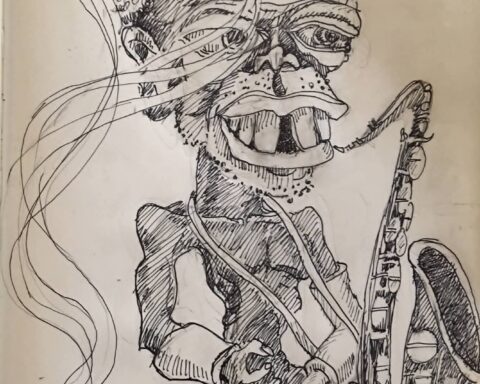Today is November 16 and it is a day like no other. Not because, on this day, the sun rises from the south and sets in the north. No. But because it is a great day famous for the great things that have come to be associated with it, for it is on this day, precisely November 16 1930 that the great novelist Albert Chinualumogu Achebe was born. Twenty six years earlier on November 16 1904, the quintessential statesman Benjamin Nnamdi Azikiwe was born in Zungeru in the present Niger state to parents who hailed from Onitsha in 1904,
Azikiwe better known as Zik attended Storer College, Harpers Ferry, West Virginia; Lincoln University, Lincoln, Pennsylvania and Howard University in Washington D.C. It was at Storer College that he got the fond name “Zik”. The credit for the coinage goes to Ulric von Bowe, a Canadian who was supposed to work with Azikiwe at the college farm. The Canadian had mused: “Well I`ll be doggone, if it ain`t our old friend Zik!.
Zik grew to become an instructor in political science at Lincoln University, USA, Editor-in-Chief of The Morning Post in Accra, Ghana, and publisher of Zik Group of newspapers in Nigeria of which then influential West African pilot was the flagship.
A Primus inter pares and outstanding orator, Zik was the first Premier of the defunct Eastern Region, first President of the Nigerian Senate, first Governor-General of Nigeria and the first President and Commander-in-Chief of the Nigerian Armed Forces .Once described as “the dean of Nigerian politics and a fighter of superlative merit”, Zik led the nationalist vanguard in the fight against colonialism and imperialism in Nigeria.
He was a man of many parts; sportsman, raconteur, businessman, orator, intellectual, nationalist, pan-pan Africanist, and visionary. In 2019, his final resting place the Zik Mausoleum was commissioned as an addition to the long list of the due recognitions accorded him by a grateful nation. At his death in 1996, the Nigerian government, renamed the international Airport in the nation’s capital Abuja after him.
The concept of Zikism was weaved around his nationalism, activism and intellectualism. The age of Zikism “coincided with the age of reason, `swadeshi`, of aggressive nationalism”.
At this time the two books which moulded the political thinking of Nigeria youth were Nnamdi Azikiwe`s Renascent Africa and Nwafor Orizu`s Without Bitterness. Azikiwe`s book written in 1937 at the end of his Gold Coast (now Ghana), sojourn, advocated Social Regeneration, Mental Emancipation, Economic Determinism, Political Resurgence and Spiritual Balance. These nebulous concept were “queer synthesis of Marxism, Garveyism and Itaism; only that Marxism therein masqueraded as communalism, Garveyism as enlightened pan-Africanism and Itaism as fervid nationalism which only youth could interpret”. To many “Renascent Africa was more than a book. It was a guiding light for youth throughout Nigeria and in some important West Africa towns”. Indeed, The Renascent Africa was verbose without being specific,
moving without being profound, as great books often are, but it did for Nigera what Rousseau`s Social Contract did for 18th century. France or Marx`s Das Kapital did for 19th century Germany. Altogether it was an inspiring book which the youths swallowed hook, line and sinker, being adopted by the national church of Nigeria as the new Bible on its formation by the Zikists in 1948. Azikiwe had earlier observed: “not oblivious of my handicap, in this century, there is no better means to arouse African people than that of the power of the pen and the tongue “the Renascent Africa indeed epitomized the power of the pen.
As an iconic journalist, Zik utilized his chain of newspapers to wage the war against colonialism. His Inside Stuff column in the West African Pilot was a must read and very trenchant in its attack on the colonial masters. His pen was very potent and invariably mightier than the sword.
Pen power however got greater expression in 1958 when William Heinemann Ltd published CHINUA ACHEBE`s first novel Things Fall Apart which has been acclaimed as one of the 100 most famous books. Born in 1930, Chinua Achebe was brought up in a Christian evangelical family in the large village of Ogidi, one of the first centres of Anglican missionary work in Igbo land, Eastern Nigeria.
After studying medicine and literature at the University of Ibadan, he went to work for the Nigeria Broadcasting Company in Lagos.
His career in radio ended abruptly in 1966 when he left his position as Director of External Broadcasting, Lagos, during the national upheaval and massacres that led to the Biafran War. He had narrowly escaped confrontation with armed soldiers who apparently believed that his novel, A Man of the People, implicated him in Nigeria`s first military coup.
His career as a university academic began in 1967 with his appointment as Senior Research Fellow at the university Nigeria. He was made Emeritus Professor in 1985. Achebe has received numerous honours from different parts of the world, including over thirty honorary degree from universities across the world in 1987, he received Nigeria`s highest award for intellectual achievement, the Nigeria National Merit Award. In 2002, he was awarded the prestigious Peace Prize of the German Book Trade. In 2007, he was named the winner of the Man Booker International Prize, in honour of his literary career.
Achebe is the author of many novels, short stories, essays and children`s books. Things Fall Apart, his first novel, was published in 1958. It was followed by No Longer at Ease (1960), Arrow of God (1964), which worn the first New Statement Jock Campbell Prize, and A Man of the People (1966). Anthills of the Savannah was shortlisted for the Booker McConnell Prize in 1987. His books of poetry, Beware Soul Brother, won the commonwealth poetry prize in 1972.
His status is based on the cumulative publication of a number of highly commended works of creative writing. Things Fall Apart has been translated into more than fifty languages, an unparalleled accomplishment by any other literary work from Africa.
Conceived as a response to the denigration of Africa in colonial novels such as Joseph Conrad`s Heart of Darkness (1899) and Joyce Cary`a Mister johnson (1939), Things Fall Apart stretches the novel form to create a space for the authentic African subject and his or her world. It seeks to go beyond the colonial depiction of grunting `savages` and `cannibals` with no language or cultural and historical links to their physical environment and, as such, it reverses the colonial gaze in order to reveal an essential humanity that the colonial novel either deliberately elided or repressed or was incapable of articulating.
Azikiwe and Achebe were united in deploying the pen in changing the Nigeria condition, the poor perception of Africans and the communality of the human race. Happy birthday to this two of a kind. The world is better today because you passed through this path.



























